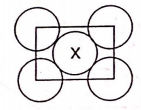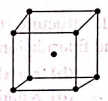A compound formed by elements A and B crystallizes in cubic structure where A atoms are at the corners or a cube and B atoms are at the face centre. The formula of the compound is :
1. AB
2. AB2
3. AB3
4. AB4
The radius of Ag+ ion is 126 pm while that of I- ion is 216 pm. The coordination number of Ag in AgI is
1. 8
2. 6
3. 4
4. 2
Which of the following crystals have 6:6 coordination?
1. MnO
2. NH4I
3. ZnS
4. none of these
TiO2 (rutile) shows 6:3 coordination. The solid having rutile like structure among the following is
1. KCl
2. SnO2
3. ZnS
4. none of these
A solid having unit cell made up of planes as shown in figure coordination number of 'X' is

1. 12
2. 10
3. 6
4. 4
A compound contains two types of atoms: X and Y. It crystallizes in a cubic lattice with atoms X at the corners of the unit cell and atoms Y at the body centres.
The simples possible formula of this compound is:
1. XY
2. X2Y2
3. XY6
4. X8Y
The edge length of the unit cell of NaCl crystal lattice is 552 pm. If the ionic radius of sodium ion is 95 pm. What is the ionic radius of chloride ion?
1. 181 pm
2. 190 pm
3. 276 pm
3. 368 pm
The second order Bragg diffraction of X-rays, with from a set of parallel planes in a metal, occurs at an angle of The distance between the scattering planes in the crystal is
1. 2.00 Å
2. 1.00 Å
3. 0.575 Å
4. 1.15 Å
The closest distance between two atoms (in terms of edge length) would be highest for which of unit cell, assuming the edge length of each unit cell be 'a'
1. FCC unit cell
2. BCC unit cell
3. diamond unit cell
4. primitive cubic cell
A X+ Y- has the Y- ions arranged as below. If the X+ ions occupy half of the tetrahedral sites in the structure. The formula of solid is

1. XY
2. X3Y4
3. XY2
4. X2Y






